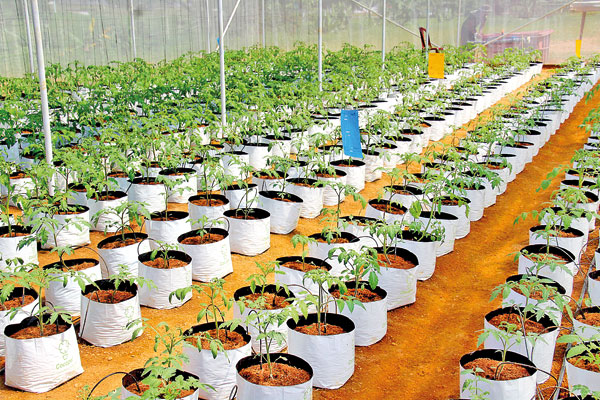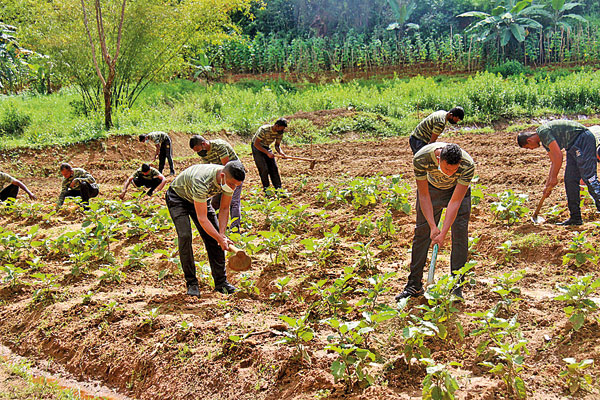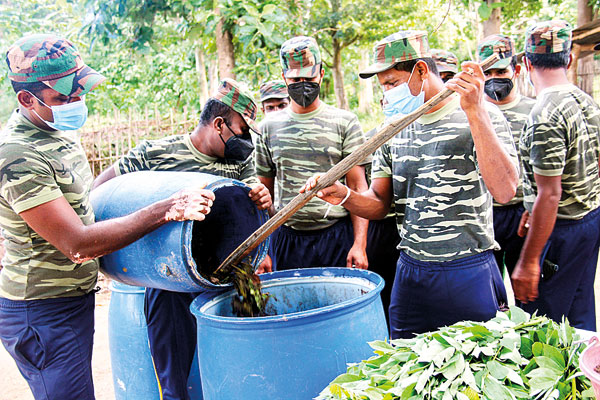News
Fertile ground for national reconciliation: Army and ex-Tigers join hands to turn swords into ploughshares
SLA's Agriculture and Livestock Directorate chief outlines battle plans to win hunger war through green agriculture policy and use of organic fertiliser
By Rekha Tharangani Fonseka

Sri Lanka Army soldiers and former separatist rebels are teaming up to turn former battlefields into agri-fields, breaking new ground in reconciliation.
Some of the former areas which witnessed intense battles between the security forces and the Liberation Tigers of Tamil Eelam (LTTE) in the northern and eastern areas are now being converted into farmlands under a Sri Lanka Army project, making former foes into friends.
In farmlands in Jaffna, Vavuniya, Thoppigala, Aralaganwila, Vellankulama and Adiya Puliyankulama soldiers are seen working shoulder to shoulder with rehabilitated LTTE cadres.
Brigadier Arosha Rajapaksha, head of the Army’s Directorate for Agriculture and Livestock, told the Sunday Times that the project was being implemented by the defence forces on the instructions of President Gotabaya Rajapaksa and Army Commander General Shavendra Silva. It comes under the Agriculture and Livestock Development Regiment commissioned on January 4 last year. The regiment consists of a Junior Regiment regular unit, four volunteer units and a training school.
The project is being supervised by the directorate which has the services of some 80 experts. They include about 40 agriculture degree and master’s degree holders. The directorate also has about 1800 soldiers to carry out its agriculture projects.
Brig. Rajapaksha said about 84 rehabilitated LTTE cadres, including 11 female cadres, had joined the Regiment’s voluntary unit.
Apart from the battlefield-turned-farmlands, the directorate also runs more farms in military camps and about 575 unemployed youths who show a keen interest in a career in agriculture have been recruited to work in the farms. More recruitment is also on the card.
The new recruits are undergoing a training programme to learn agriculture technology and the use of machinery.

The Army's agri-regiment troops on the frontlines of battle to ensure country's food security
At present, about 3,572 acres are being cultivated under this project launched to buttress the Government’s national campaign for self-sufficiency in essential vegetables, dairy products and grain varieties. The directorate hopes to expand the total area under cultivation to 8,000 acres in the next two years, Brig. Rajapaksha said.
The project also supplements the Government’s ‘Green Agriculture’ policy through the Green Agriculture Operations Centre (GAOC) which was set up recently and placed under the direction of Army Commander Shavendra Silva. The Sri Lanka Army’s ‘Thuru Mithuru Nawa Ratak’ concept which aims to transform Sri Lanka into a self-sufficient and self-sustainable country is also part of this green agriculture policy.
The brigadier said cultivation work had already begun in these Army-run farmlands. The crops include paddy, vegetables, turmeric, green gram, maize, sesame, cowpea, manioc, coconut, mango, orange, red onion, big onion, chili and cinnamon. In addition, pilot projects have been launched in Galle, Diyatalawa, Karandeniya, Battaramulla, Menik Farm Army camps to grow tea, cinnamon, coconut and pepper. Also grown are paddy varieties such as Suwandel, Pachchaperumal, Kalu Heenati and Madathavalu.
This time, the Army cultivated chilies on a large scale in Jaffna and Vavuniya and obtained 10,000 kilos in the first harvest. The produce was sent to Spice Council.
The brigadier said that in keeping with the Government’s policy, they were making arrangement to cultivate crops using organic fertiliser together with the latest agriculture technology.
He said the Army has plans to use earthworm liquid manure and natural pesticide in addition to organic fertiliser to produce quality poison-free agri-products.
He said moves were underway to produce quality organic fertiliser under the initiative of the Green Agriculture Operation Centre. The organic fertiliser programme would take into account each region’s soil, geological and environmental conditions to produce the right fertiliser for crops endemic to a particular region.
The brigadier said the initiative to produce organic fertiliser aims at a target of 25,000 metric tonnes during the first phase. So far, some 6,700 metric tonnes of carbonic fertiliser have been produced. The stocks were sent to Lakpohora Company which was able to sell 225 metric tonnes.
The programme’s ultimate goal was to provide free organic fertiliser to farmers.
Poultry farms are also part of the project. These farms rear some 25,000 hens and produce 20,000 eggs on a daily basis.
At its Kandakadu farm, the Army is growing 49,000 TJC mango trees and hopes to take the total to 62,000 trees. There is a huge demand for TJC species in foreign countries as they are considered the world’s juiciest mango. The Army hopes to export the products, Brig. Rajapaksha said.
The best way to say that you found the home of your dreams is by finding it on Hitad.lk. We have listings for apartments for sale or rent in Sri Lanka, no matter what locale you're looking for! Whether you live in Colombo, Galle, Kandy, Matara, Jaffna and more - we've got them all!

